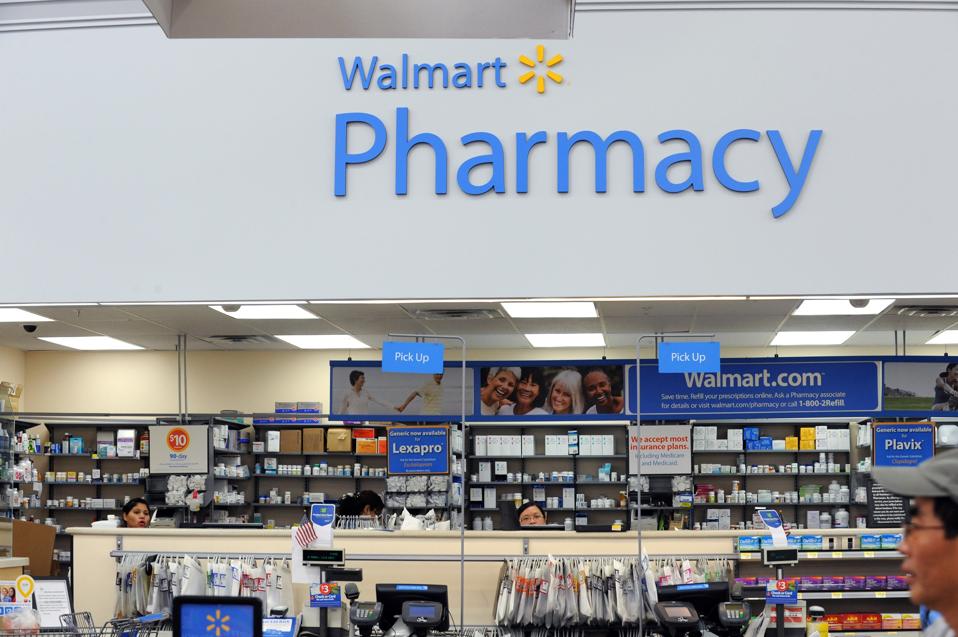As Walgreens and Walmart scale back their investments in physician-staffed health clinics, they are forging ahead into the lucrative business of specialty pharmacy.
Walmart Tuesday said it’s closing its 51 Walmart Health centers in five states and Walmart Health Virtual Care, which is the retailer’s telehealth business. Instead, Walmart will ramp up its efforts in pharmacy and specialty pharmacy.
“While we will no longer operate health centers, we will take what we learned as we provide trusted health and wellness services across the country through our nearly 4,600 pharmacies and more than 3,000 vision Centers,” Walmart said in a blog post announcing the end of its Walmart Health and Walmart virtual care businesses. “For 40 years, we have provided these high quality, accessible and affordable points of care that are integral to their respective communities.”
Specialty pharmacies are an increasingly important player in the U.S. health system given the flood of expensive drugs on the market derived from biotechnology. Such medicines are more complicated than pills and capsules picked up at the corner drugstore and often require specialized administration, refrigeration, packaging and patient instructions.
Just last week, Walgreens announced plans to launch Walgreens Specialty Pharmacy, a $24 billion business that integrates a new pharmacy equipped to handle gene and cell therapies with its existing pharmacy assets including the large specialty pharmacy and home delivery business, AllianceRx.
The Walgreens move, which takes effect August 1 when AllianceRx Walgreens Pharmacy becomes Walgreens Specialty Pharmacy, comes as Walgreens CEO Tim Wentworth works to engineer a financial turnaround focusing on providing more healthcare services in stores while beefing up the more lucrative aspects of pharmacy. Under Wentworth, Walgreens has dramatically scaled back the opening of doctor-staffed retail clinics with its partner VillageMD and instead is investing in pharmacy, specialty pharmacy and other more lucrative services.
Americans, their health insurers and employers are now spending more on specialized drugs than pills, capsules and tablets. Specialty medications account for 1%-2% of a typical employer’s overall prescription volume, yet these medications account for approximately 50% of total annual pharmacy spend, according to the employee benefit consultancy Mercer.
Meanwhile, prescription costs are fueling the overall costs for employer-based health insurance coverage thanks to new specialized medications like the weight loss drug Ozempic and similar injectable specialty drugs. Weight loss prescriptions Wegovy, Rybelsus and Saxenda—along with diabetes drug Ozempic, often used off label for weight loss—are driving health costs for employers up by more than $300 per insured worker, data released last fall from benefits consultancy Aon says.
Just this week, representatives from Walgreens, Walmart, CVS Health and Amazon are among the specialty pharmacy executives that flocked to Las Vegas for the 20th annual Asembia AXS24 conference, which drew more than 8,000 attendees. Asembia executives said the meeting has grown from “two dozen original attendees who attended our first summit.”
“Over the past few years, the importance of pharmacies has continued to grow, and we have expanded the clinical capabilities of the services we provide,” Walmart’s blog post said. “We continue to offer immunizations and have grown to provide testing and treatment services, access to specialty pharmacy medication and care, as well as other essential services such as medication therapy management and a variety of health screenings. With more than 4,000 of our stores in medical provider shortage areas, our pharmacies are often the front door of healthcare.”

